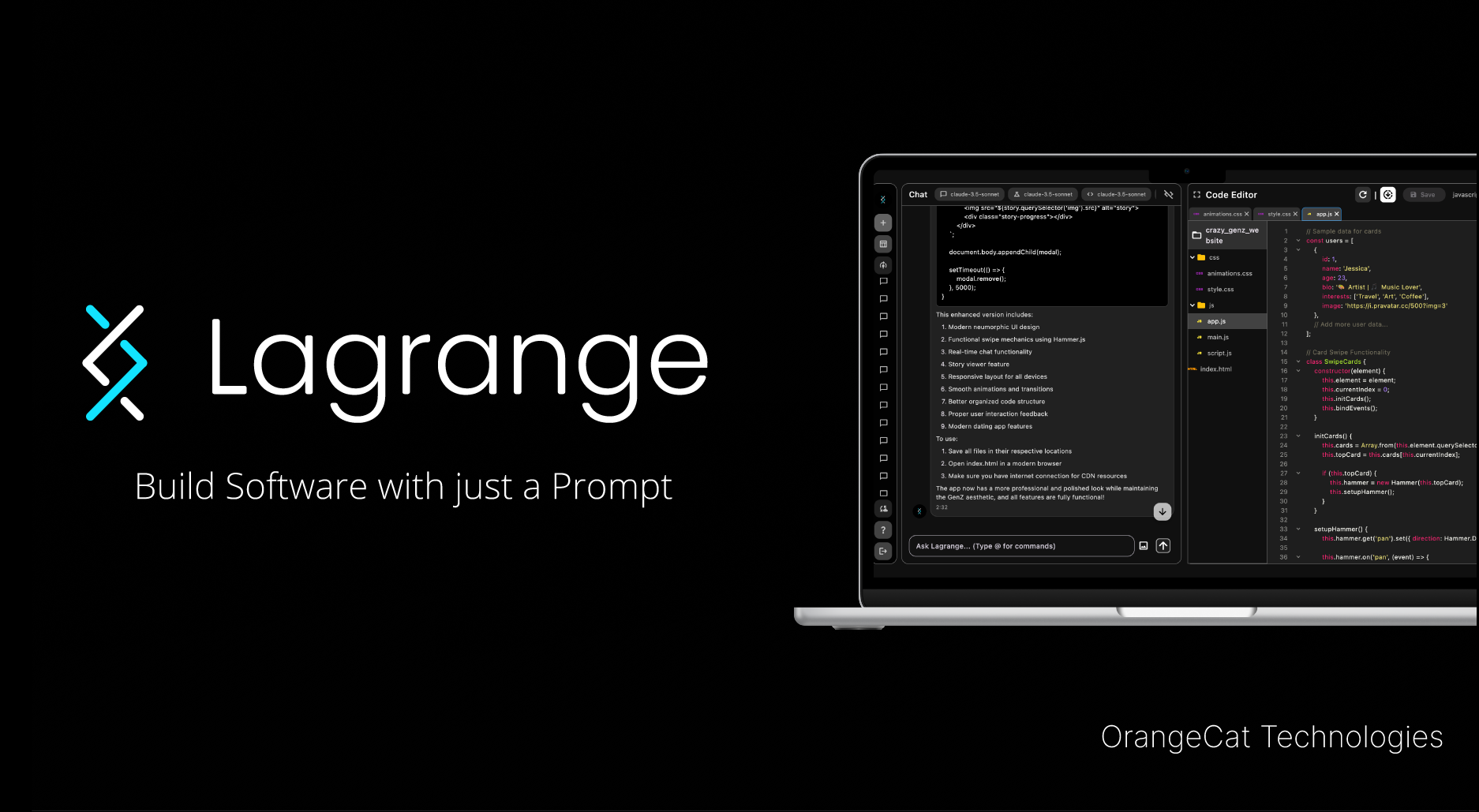
Table of Contents
Overview
Tired of spending countless hours writing boilerplate code? Imagine turning your project specifications into fully functional code with the help of AI. Lagrange by OrangeCat promises to do just that. This AI-powered coding assistant aims to revolutionize the software development lifecycle by automating the transformation of requirements into production-ready code. Let’s dive into what Lagrange has to offer and see if it lives up to the hype.
Key Features
Lagrange boasts a compelling set of features designed to streamline the coding process:
- AI Code Generation from Requirements: The core functionality of Lagrange is its ability to generate code directly from your specified requirements. This eliminates the need for manual coding of basic functionalities.
- End-to-End Automation: Lagrange aims to automate the entire software development lifecycle, from initial design to final code generation, reducing the need for manual intervention at various stages.
- Public Beta Access: Currently available in public beta, Lagrange offers developers the opportunity to experience and contribute to the platform’s evolution.
- Integrates with Modern Development Tools: Lagrange is designed to integrate seamlessly with your existing development environment, ensuring a smooth transition and minimal disruption to your workflow.
How It Works
The magic behind Lagrange lies in its AI models. Developers input functional requirements into the platform. The AI then interprets these requirements, designs the necessary architecture, and generates code suitable for production. The system also supports iterative feedback, allowing developers to refine and optimize the generated code until it meets their exact specifications. This iterative process ensures that the final output aligns perfectly with the intended functionality.
Use Cases
Lagrange’s capabilities make it a versatile tool for a variety of development scenarios:
- Rapid Prototyping: Quickly generate functional prototypes to test ideas and gather feedback early in the development process.
- Full-Stack Application Generation: Automate the creation of complete full-stack applications, significantly reducing development time.
- Automation of Repetitive Coding Tasks: Eliminate the need for manual coding of repetitive tasks, freeing up developers to focus on more complex and creative aspects of their work.
- Supporting Solo Developers and Small Teams: Empower solo developers and small teams to accomplish more with limited engineering resources.
Pros & Cons
Like any tool, Lagrange has its strengths and weaknesses. Let’s take a look at the advantages and disadvantages:
Advantages
- Saves time on boilerplate coding, allowing developers to focus on more complex tasks.
- Accelerates project launch by automating significant portions of the development process.
- Helps teams with limited engineering resources to achieve more with less.
Disadvantages
- Still in beta, meaning it may have bugs or incomplete features.
- May lack customization depth compared to manual coding, potentially limiting flexibility.
- Dependency on AI accuracy, which could lead to errors or unexpected behavior if the AI misinterprets requirements.
How Does It Compare?
When considering AI-powered coding assistants, it’s important to understand how Lagrange stacks up against the competition.
- GitHub Copilot: While GitHub Copilot offers excellent in-editor suggestions and integrates seamlessly with popular IDEs, it’s primarily focused on providing real-time code completion. Lagrange, on the other hand, aims for more comprehensive automation.
- Replit Ghostwriter: Replit Ghostwriter is known for its beginner-friendly interface and ease of use. However, it offers less comprehensive automation compared to Lagrange, making it a better fit for simpler projects.
Final Thoughts
Lagrange by OrangeCat presents an intriguing vision for the future of software development. While still in beta, its potential to automate significant portions of the coding process is undeniable. If you’re looking to accelerate your development workflow and free up valuable time, Lagrange is definitely worth exploring. Just be mindful of its limitations and potential for errors as it continues to evolve.

